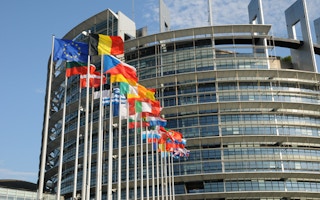In a torrent of apparent bad news for many, including for the climate movement, a wave of extremist, nationalist, anti-immigrant and generally anti-science parties won elections to the European Parliament on Monday, 26 May in Britain, France, Denmark, Sweden, Greece and Poland. Astoundingly, the European Parliament is even going to make some space for neo-Nazis, belligerent xenophobes and Holocaust-deniers.
To continue reading, subscribe to Eco‑Business.
There's something for everyone. We offer a range of subscription plans.
- Access our stories and receive our Insights Weekly newsletter with the free EB Member plan.
- Unlock unlimited access to our content and archive with EB Circle.
- Publish your content with EB Premium.
How will Europe’s world-leading climate and energy agenda fare under these elections which significantly reshape the make-up of the European Parliament? Europe after all sets an example for others to follow, with its commitments to reduce CO2 emissions by 40 per cent and to generate about a third of its electricity from renewable sources by 2030. It also has its European Union Emissions Trading Scheme, which although is stuttering, leads the world in its application of cap and trade principles to the challenges of global warming and rising emissions.
A strongly pro-climate-action European Parliament is integral to Europe’s leadership in climate policy. It is the EU’s only democratically-elected institution and routinely leads the European Commission and the EU Member States on climate action. When the EU pushes the Chinese, Indians and Americans forward on climate, it’s the European Parliament which helps stiffen its resolve and this role is likely to become more important as nations attempt to get a decisive deal done by the end of the UN climate talks in Paris in November 2015.
As it happens, the European Parliament elections “earthquake” – and the related rise of the “extremes” in Brussels – is good news for climate action for three reasons.
First, two broad groupings matter at the European Parliament: the “centre-right” and the “centre-left”. All are pro-Europe and together they continue to represent some 70 per cent of all Members of the European Parliament (or MEPs), a huge majority.
“
Within the pro-Europe majority, the centre-left grouping (composed of the Socialists and Democrats Group and of the Greens) will have a greater share of the vote than before because they proportionately lost far fewer seats than the centre-right European People’s Party. The centre-left, stronger on the climate agenda, therefore gains more influence
Second, within the pro-Europe majority, the centre-left grouping (composed of the Socialists and Democrats Group and of the Greens) will have a greater share of the vote than before because they proportionately lost far fewer seats than the centre-right European People’s Party. The centre-left, stronger on the climate agenda, therefore gains more influence.
Furthermore, the balance of power in the European Parliament will be more on the centre-left than it has been in the past 15 years. Whereas in the outgoing European Parliament, the centre-right could ignore both the Greens and the Socialists and Democrats Group in the powerful Environmental Committee, they will now have to trade with them systematically to get things done and won’t be able to get what they want on their own.
Third, the Greens more or less held the line as the fourth largest coherent political group in Brussels and will be more influential than ever before because more “extremes” means fewer active MEPs. For a long time, the European Parliament has had its fair share of climate sceptics (and these often come in the same bucket as the anti-science, anti-immigrant extremist nationalists). In fact, at several meetings I held with a representative sample a few months ago, what these MEPs seemed to have in common was a distinct lack of any familiarity with the energy and climate agenda they were considering. Their level of interest in the topic was low and their attendance records poor.
Now that the recent election results guarantee that we will have more of them, the newly elected will join their similarly-minded colleagues in being splendidly inactive and uninterested. And when they do bother to vote, half will vote one way, while the other half will vote the other way, and they will therefore nullify each other most of the time. As Mark Watts, a former British MEP and director of Luther Pendragon Brussels, a communications strategy shop, told me, “the surge of support for anti-European parties will have a limited effect on the day to day business of the European institutions because their voting record to date has been fragmented and the more centrist groups will likely try to exclude or marginalise them”.
I am not going to worry very much about the European Parliament’s world-beating leadership on energy and climate, even if these results were representative of what will happen in national elections, which they aren’t. This will be a parliament with a greater emphasis on social issues including, in particular, climate change. Expect a more sustained push to get the EU emission trading scheme to deliver, and a stronger commitment to emission reductions and to renewable energy across Europe.











